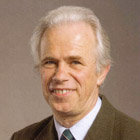Prof. Christian Wilhelm
Institute Of Biology I
The University of Leipzig, Germany
Phone: +49 341 97-36874
Fax: +49 341 97-36899
Email: [email protected]
About Christian
Prof Wilhelm is a specialist in the whole cell physiology of microalgae. His interest is focused on the mechanisms which regulate the energy conversion efficiency from photon to biomass. A better understanding of complete energy balances is essential for the identification of targets which need optimisation. Some of the most significant contributions to his field of research include:
Identification and quantification of heat emitting processes in photosynthesis and metabolism. Prof Wilhelm has quantified the energy losses by alternative electron transports and respiration rates under different light climates and by different key organisms (e.g. Plant Cell Environm. 2009). Comparing photosynthetic efficiency of diatoms with green algae different strategies have been identified to regulate carbon acquisition efficiency by specific strategies of macrodomain organisation in the thylakoid membrane.
Electron partitioning in microalgae: Using advanced semi-quantitative infra-red spectroscopy (FTIR) to quantify the macromolecular composition of the cells allows to quantify the energy flow into carbohydrates or lipids (Wagner et al. 2010). This allows to measure the light conversion efficiency into biomass depending on the reduction degree of the biomass formed.
Single cell analysis has developed to measure in-situ physiological activity of microalgal communies. This does not only allow to develop on-line methods for reactor performance control but also to learn more about how organismic interactions can be used to improve microalgal productivity.
Lipidomics has been developed as an essential tool to understand cell internal carbon flow on the whole cell level
Research Focus
In current biotechnology research on microalgae is concentrated to overcome metabolic limitations in growing cultures to improve productivity and robustness of photobioreactor performance under outdoor conditions.
The work is focussed o metabolomic engineering of different species of Chlamydomonas and Pheodactylum, but also on new species which have not been used for biotechnological applications.
Key Projects
In-situ Photo-Efficiency balance: Our projects try to construct innovative approaches to improve the photon usage into the final products by manipulating metabolic pathways.

